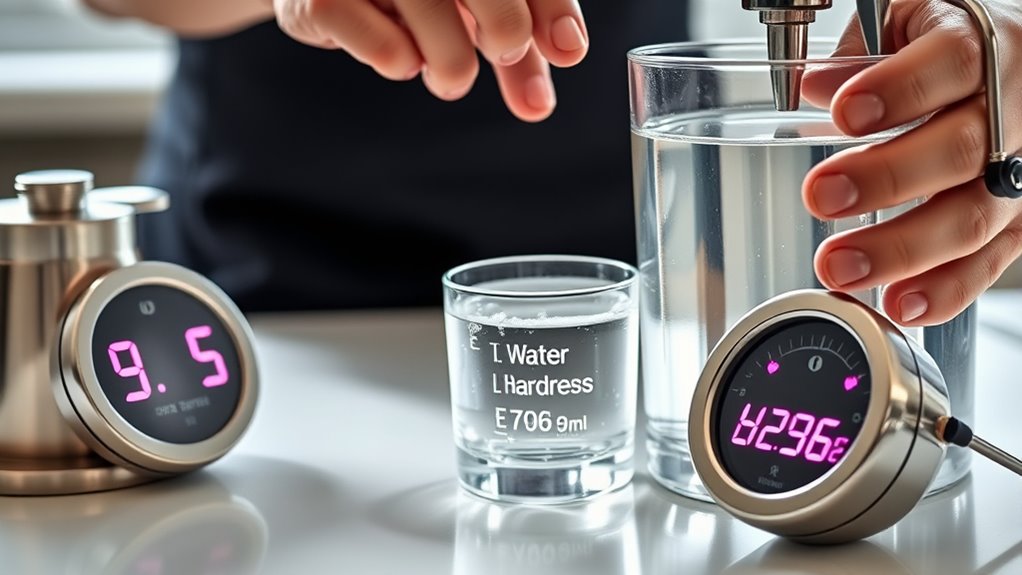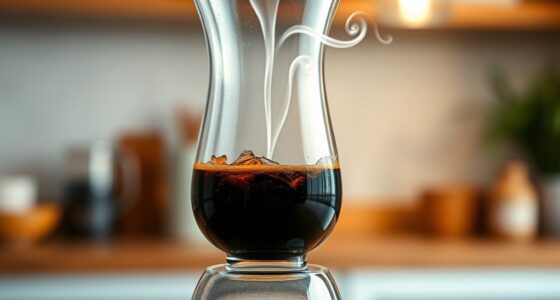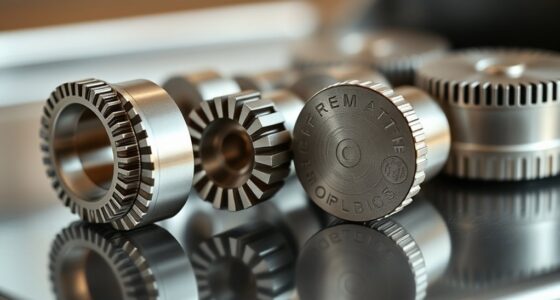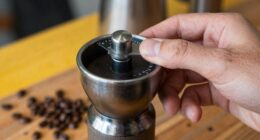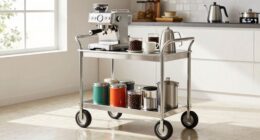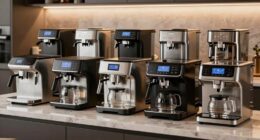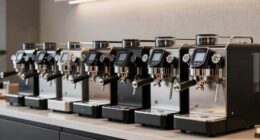To maintain perfect water hardness for coffee, start by regularly testing your water’s mineral levels, focusing on calcium and magnesium. Choose a softening method suited to your water quality, like ion exchange or filters, and keep track of changes over time. Clean and descale your equipment monthly, especially during seasonal shifts, to prevent buildup. Staying consistent with these steps guarantees superior flavor — explore further to master your water quality routine.
Key Takeaways
- Regularly assess water mineralization and pH levels to ensure optimal extraction and flavor.
- Choose and maintain an appropriate water softening system based on hardness levels.
- Conduct monthly water quality tests and keep detailed records to detect trends.
- Descale coffee equipment every 1-2 months and clean brew components weekly.
- Adjust maintenance routines seasonally according to changes in water mineral content.
Assessing Your Water Hardness Levels
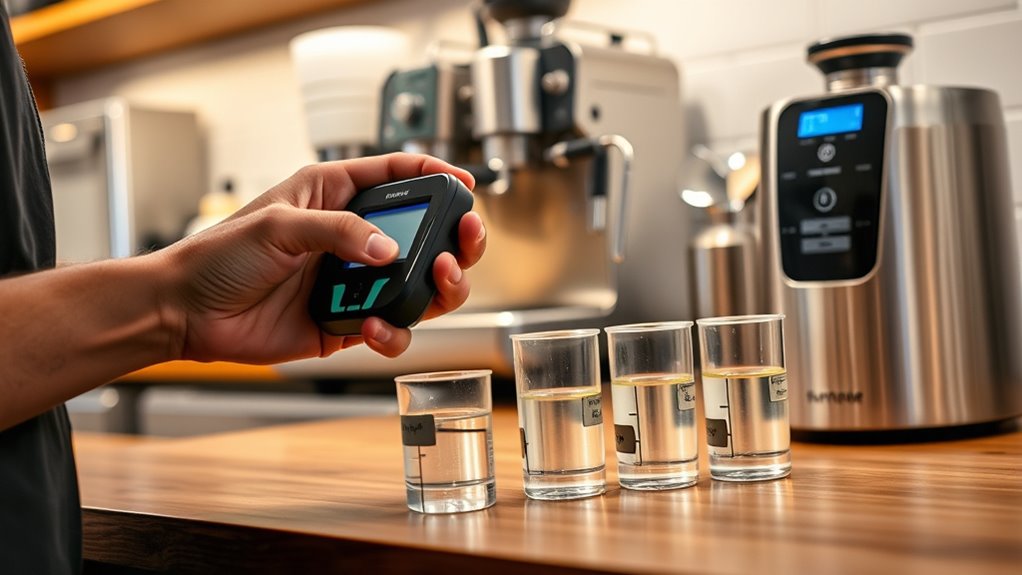
Before you can properly address water hardness issues, you need to know your current levels. Start by testing your water’s mineralization, which indicates how many minerals like calcium and magnesium are present. High mineralization means tougher water, affecting your coffee’s taste and equipment. Also, check your water’s pH balancing—ideally, it should be close to neutral (around 7). If the pH is too high or too low, it can impact extraction and flavor. Use a reliable test kit or send a sample to a lab for precise results. Knowing these levels helps you determine the severity of water hardness and guides you in choosing the right treatment methods. Regular assessment ensures you maintain ideal water conditions, supporting the best coffee quality. Incorporating water filtration can further improve water quality by reducing mineral content and contaminants.
Choosing the Right Water Softening Method
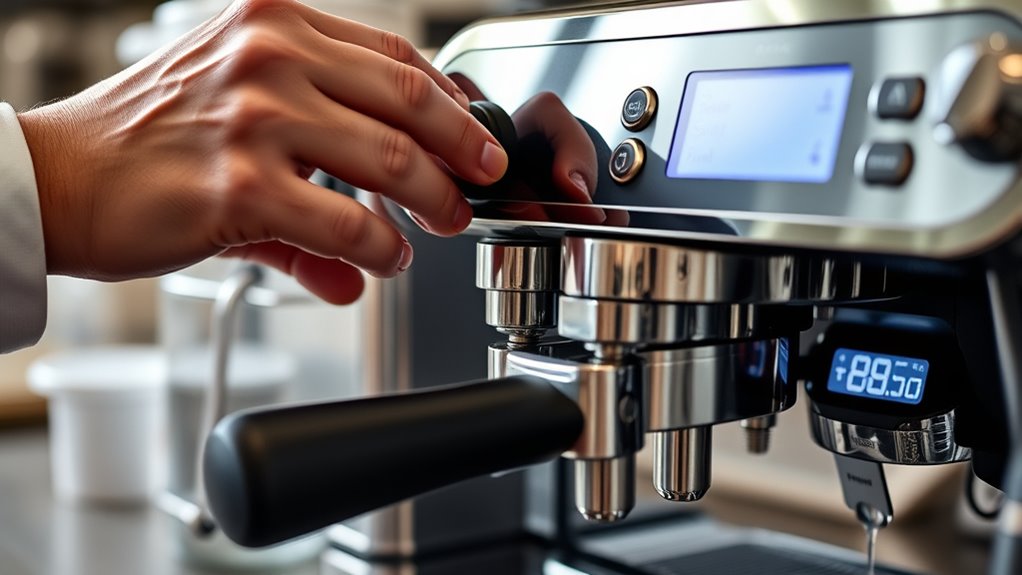
Selecting the appropriate water softening method depends on your water hardness level and your specific needs. If your water has high mineral content, a salt regeneration softener can effectively reduce calcium and magnesium buildup through ion exchange, but it requires regular salt refilling. For moderate or less demanding needs, cartridge filters offer a simple, low-maintenance solution by physically removing impurities without salt. Consider your usage frequency, maintenance preferences, and budget when choosing. Salt regeneration systems provide thorough softening but involve ongoing salt management. Cartridge filters are convenient and suitable for light to moderate hardness levels, making them ideal for home use. Additionally, understanding your water quality and flow rate can help determine the most suitable system for consistent coffee water. By understanding your water’s hardness and your maintenance capacity, you can select the most effective method for consistently perfect water for your coffee.
Regularly Testing and Monitoring Water Quality

How can you guarantee your water remains at the ideal hardness level? Regular testing and monitoring are essential. By checking your water’s mineral balance, you ensure your filtration system works effectively and prevents scale buildup. Use reliable testing kits or digital meters to measure calcium and magnesium levels. Keep a record of your results to spot trends over time. Consider these steps:
- Schedule monthly water tests to track mineral concentrations.
- Adjust your water filtration system based on test outcomes.
- Maintain a detailed log to identify patterns and optimize your routine.
- Understanding the contrast ratio helps you interpret how well your system manages dark scenes and enhances overall image quality.
Consistent monitoring helps you maintain perfect water hardness, ensuring your coffee tastes its best and your equipment lasts longer. Staying proactive with testing keeps your water quality in check and supports the ideal mineral balance.
Cleaning and Descaling Coffee Equipment
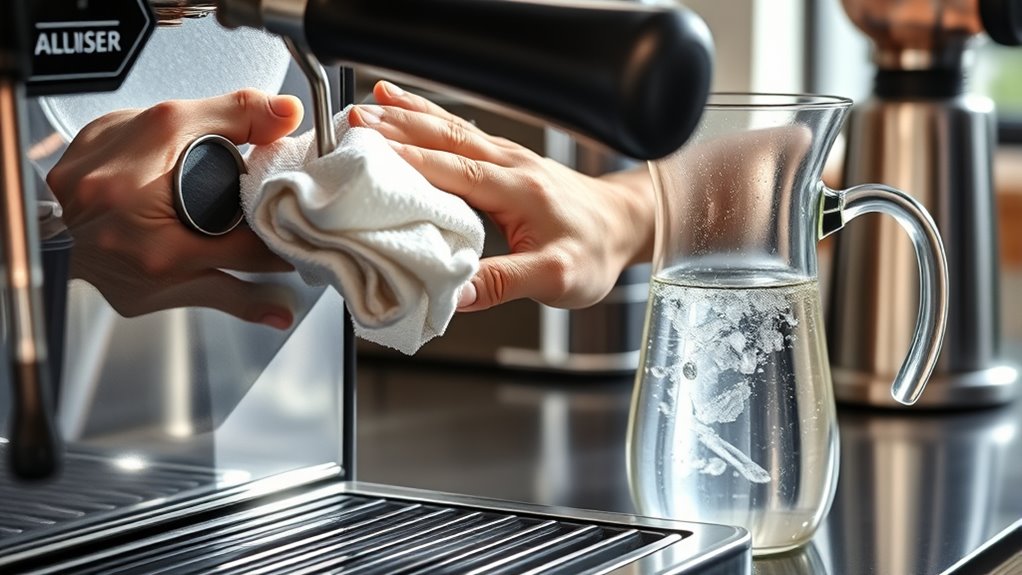
Regularly testing your water helps identify when mineral buildup is starting to affect your equipment. Over time, mineral deposits can clog your brewer, impacting brew temperature and compromising bean freshness. To prevent this, clean your coffee maker regularly with a descaling solution to remove scale buildup. Use the following table to track your cleaning schedule:
| Cleaning Task | Frequency |
|---|---|
| Descaling coffee machine | Every 1-2 months |
| Wiping brew components | Weekly |
| Checking water filters | Monthly |
Consistent cleaning ensures ideal brew temperature, preserving bean freshness and flavor quality. Avoid neglecting descaling, as mineral buildup can lead to inconsistent extraction and stale-tasting coffee. Proper maintenance keeps your equipment performing at its best. Additionally, incorporating engine tuning techniques can help optimize your coffee machine’s performance and longevity.
Adjusting Your Routine Based on Water Changes
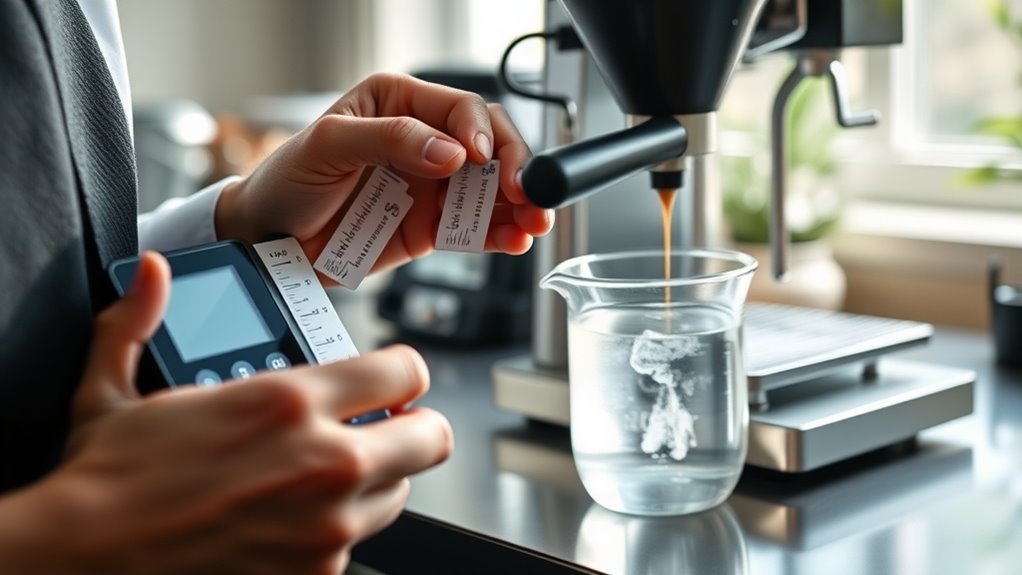
Since water quality can fluctuate over time, it’s important to adjust your maintenance routine accordingly. Seasonal water variations can alter the water mineral balance, affecting your coffee’s taste and machine longevity. To stay ahead, consider these steps:
Monitor water quality seasonally to preserve coffee flavor and machine health.
- Test your water regularly to detect changes in mineral content.
- Adjust your water treatment method, like changing filters or descaling more frequently during certain seasons.
- Keep a log of water hardness levels and maintenance actions to identify patterns linked to seasonal shifts.
- Stay informed about advances in water processing technology that can help maintain consistent water quality for optimal coffee brewing.
Frequently Asked Questions
How Often Should I Replace My Water Softener?
You should replace your water softener based on its lifespan and your replacement schedule, typically every 10 to 15 years. Regularly check for signs of wear, like reduced softening efficiency or increased salt usage. To guarantee peak performance, follow your manufacturer’s recommended maintenance and schedule replacements accordingly. Keeping track of your water softener’s age helps prevent issues and maintains perfect water hardness for your coffee.
Can Mineral-Rich Water Improve Coffee Flavor?
Mulling over mineral-rich water’s magic? Yes, mineral content can boost your coffee’s brilliance by enhancing flavor and aroma. Water mineralization adds essential minerals that balance acidity and body, creating a richer, more robust brew. When you use mineral-rich water, you’re inviting improved infusion and fuller flavor. Just guarantee your water’s mineral levels are balanced—not overly mineralized—to avoid bitterness and maintain that perfect cup every time.
What Are Natural Alternatives to Chemical Water Softeners?
You can explore natural alternatives like DIY filters made from charcoal, coconut shells, or bio-sand, which effectively reduce hardness without chemicals. Eco-friendly methods such as using mineral-rich natural spring water or adding natural ingredients like lemon or baking soda can also help soften water naturally. These options are sustainable, cost-effective, and better for the environment, helping you maintain perfect water hardness for your coffee without relying on chemical softeners.
How Does Water Temperature Affect Hardness Levels?
Think of water temperature effects like a sponge absorbing minerals; the warmer the water, the more mineral dissolution occurs. When you heat water, calcium and magnesium dissolve faster, increasing hardness levels. For example, brewing at higher temperatures can lead to overly hard water, affecting taste and equipment. Keep your water at ideal temperatures, around 195-205°F, to control mineral dissolution, maintaining consistent hardness and ensuring better coffee quality.
Are There Portable Solutions for Maintaining Water Hardness on the Go?
Yes, you can keep water hardness in check on the go using portable filters and water hardness testers. Portable filters are compact and easy to carry, allowing you to reduce minerals like calcium and magnesium before brewing. Water hardness testers help you monitor levels quickly, ensuring ideal water quality. Carry these tools during travel or outdoor adventures to maintain consistent coffee quality without relying on bulky equipment.
Conclusion
Think of your coffee setup as a delicate garden. When you nurture it with the right water, it blooms with rich flavor. Keep testing and adjusting like tending to your plants, removing weeds and nourishing the soil. With consistent care, your coffee will flourish, offering you perfect cups every time. So, stay vigilant and attentive—your brewing garden thrives on your dedication, ensuring each sip is as vibrant and invigorating as a well-tended landscape.
